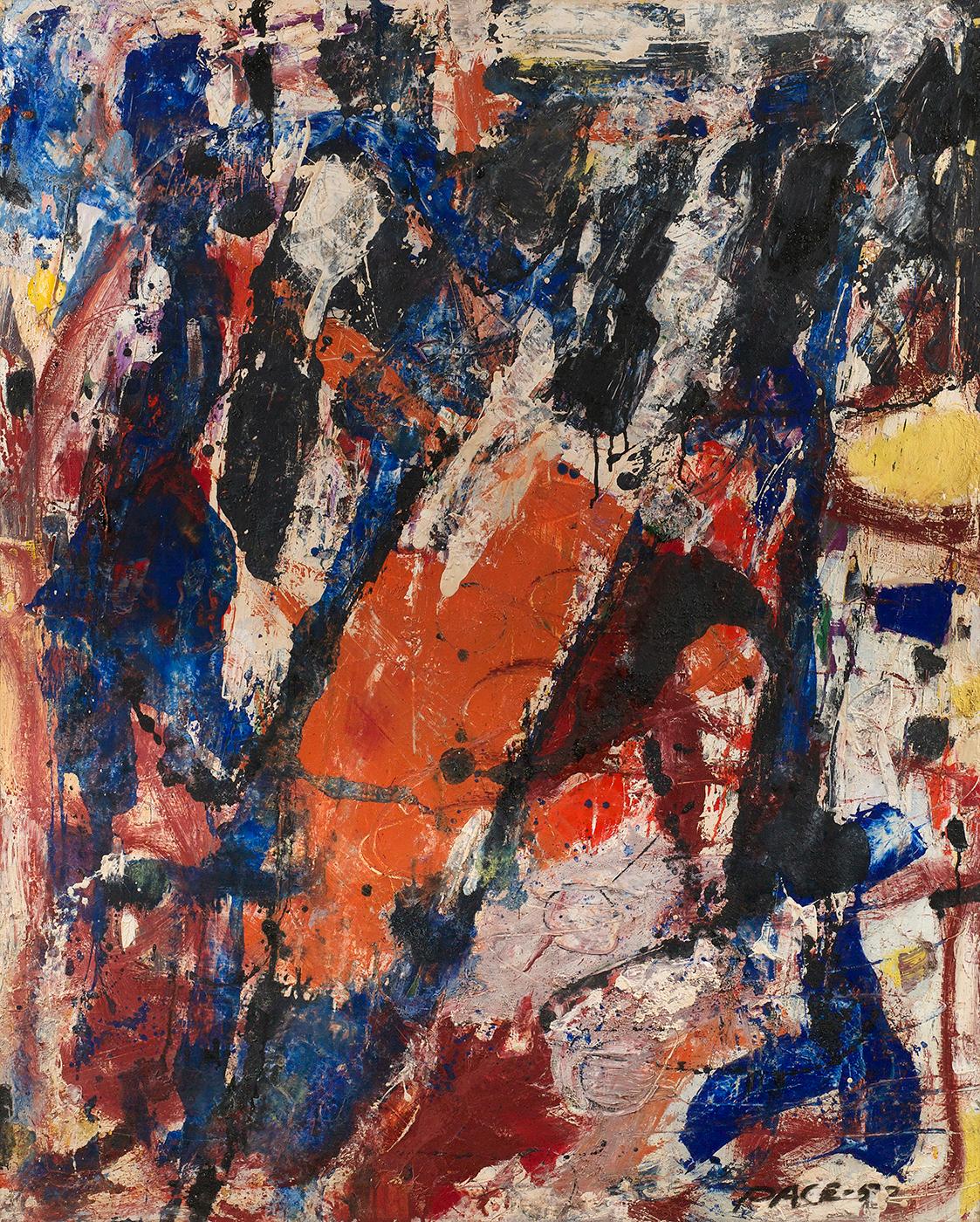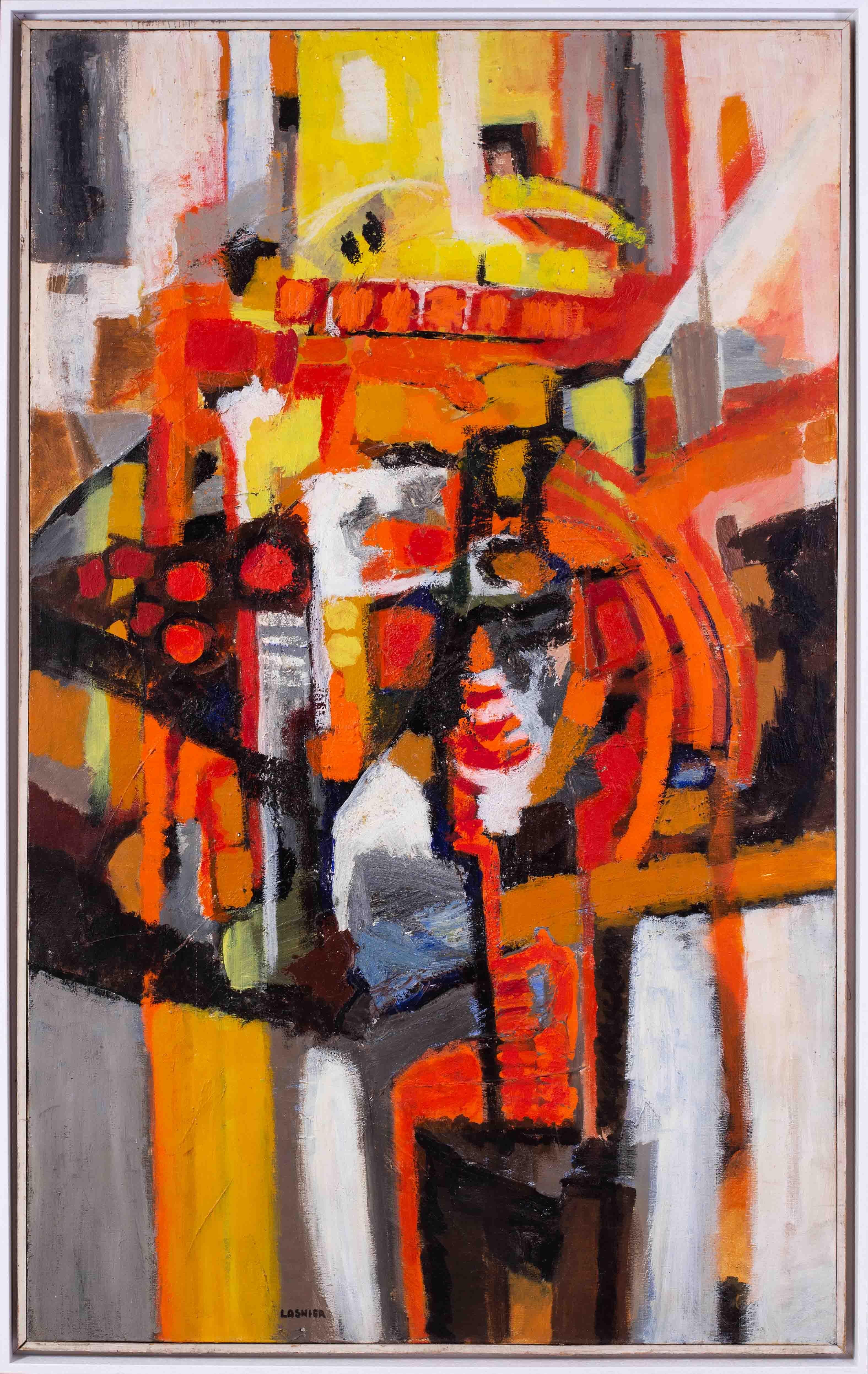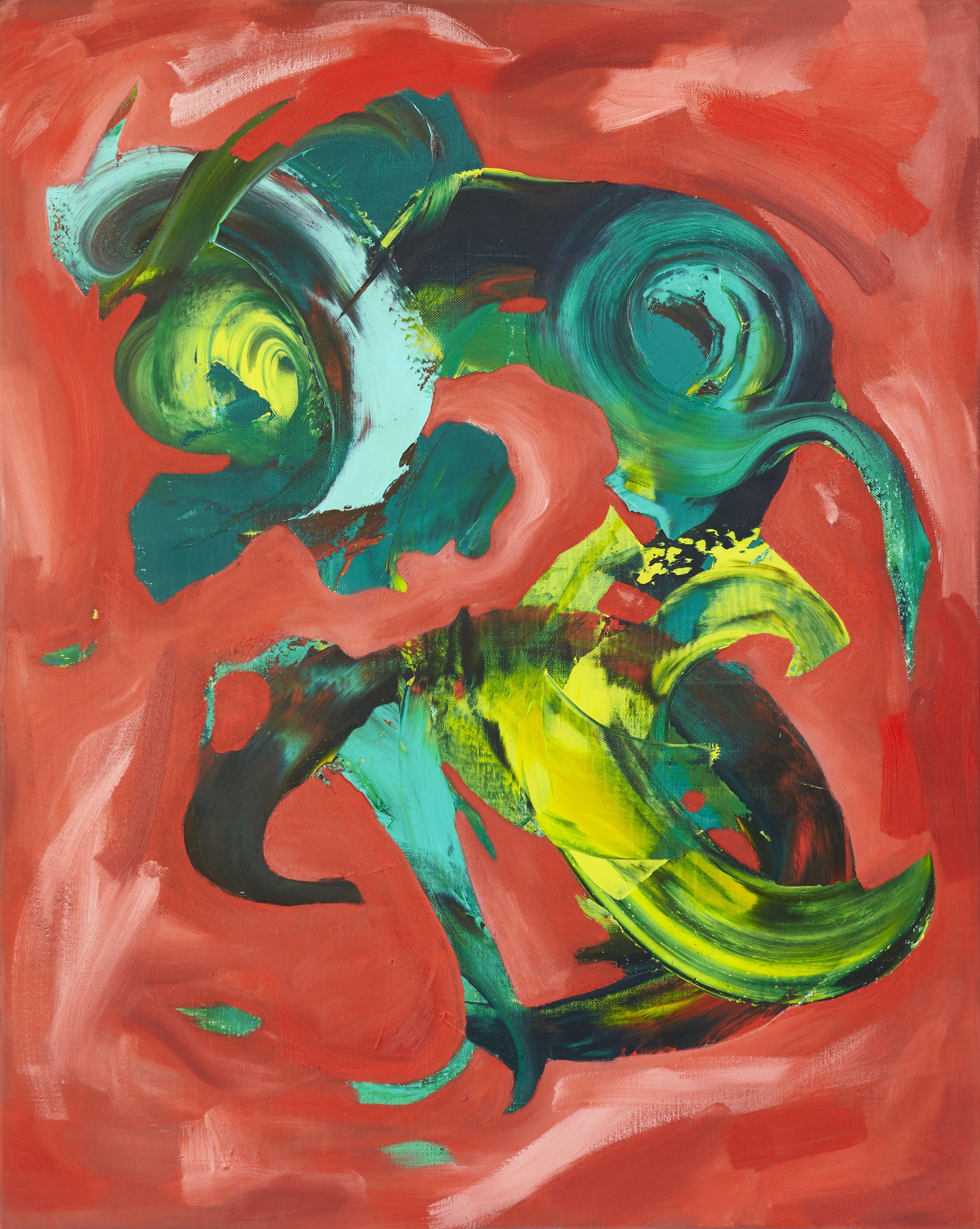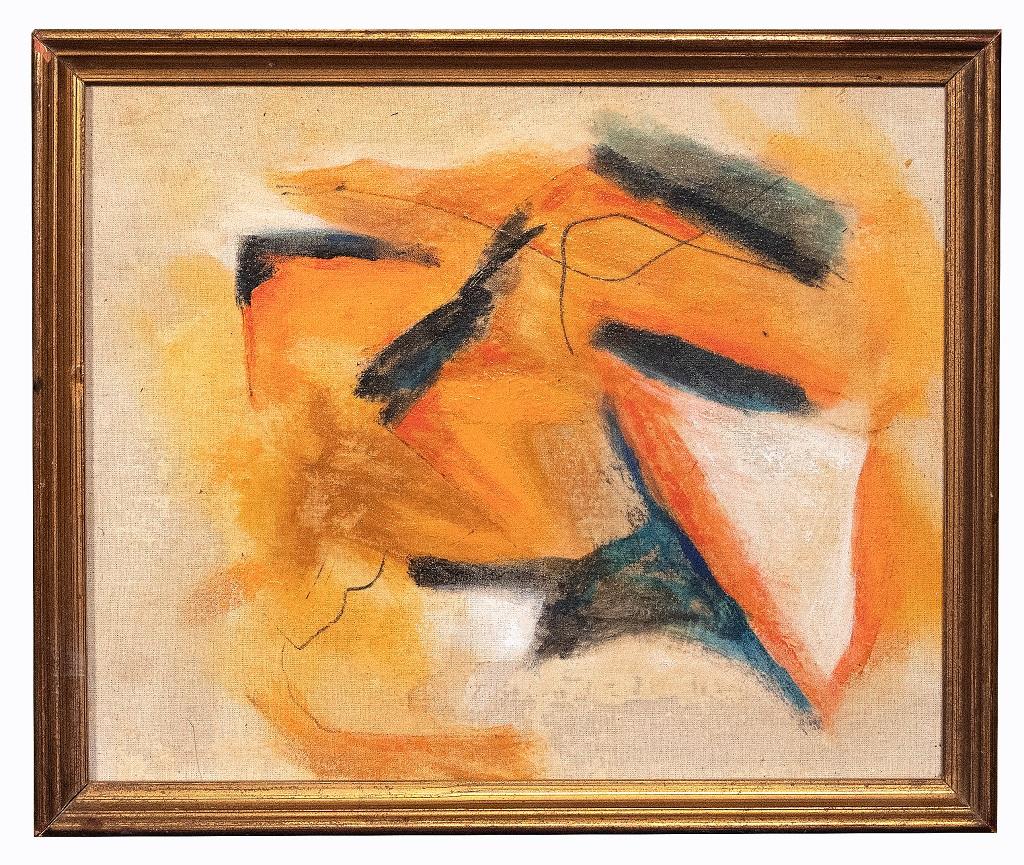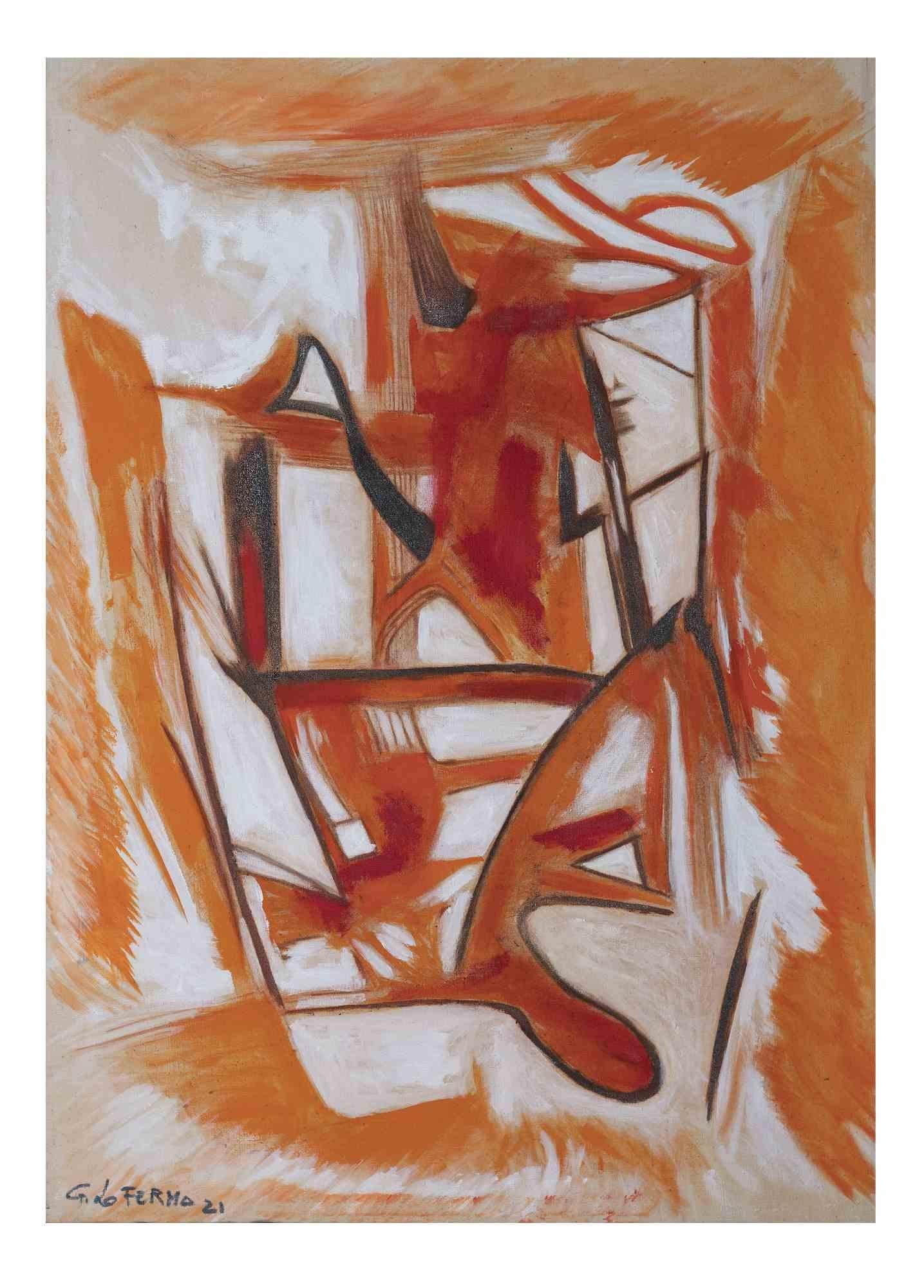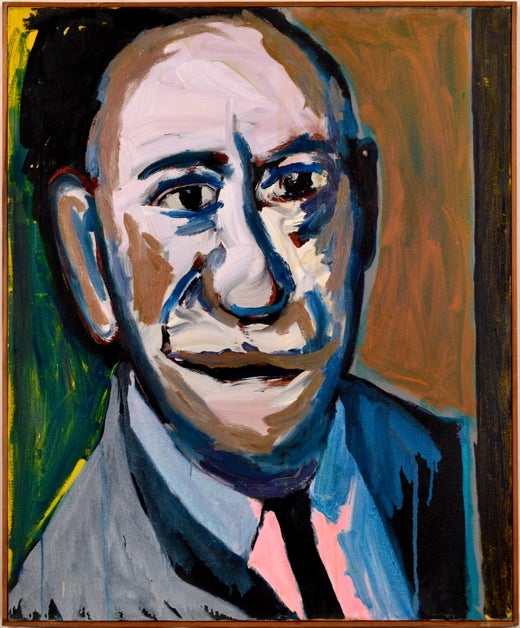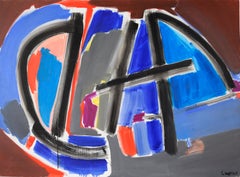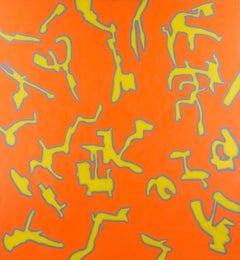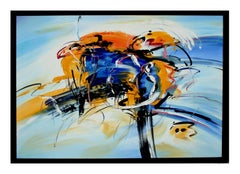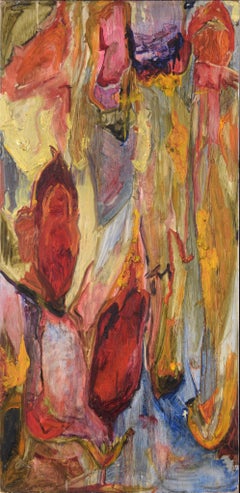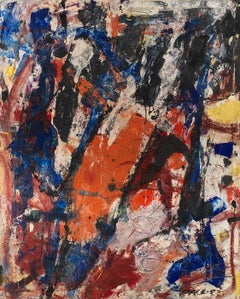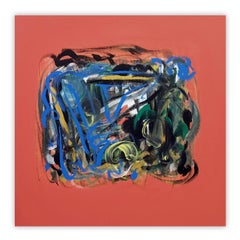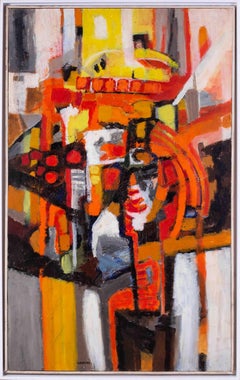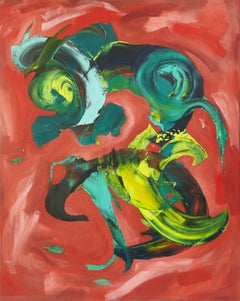Items Similar to Abstract Expressionist Composition on an Orange Field - Oil on Canvas
Want more images or videos?
Request additional images or videos from the seller
1 of 12
Peter WitwerAbstract Expressionist Composition on an Orange Field - Oil on Canvas1960s
1960s
$1,240
$1,55020% Off
£962.47
£1,203.0920% Off
€1,096.58
€1,370.7320% Off
CA$1,772.09
CA$2,215.1220% Off
A$1,929.94
A$2,412.4320% Off
CHF 1,017.59
CHF 1,271.9920% Off
MX$23,473.70
MX$29,342.1220% Off
NOK 12,796.18
NOK 15,995.2320% Off
SEK 12,001.77
SEK 15,002.2220% Off
DKK 8,188.50
DKK 10,235.6320% Off
About the Item
Multi-Color Abstract Expressionist Textural Mid-Century Abstract by Peter Witwer
A bold mid-century abstract expressionist piece exploding with heavy texture and vivid color by San Francisco artist Peter Witwer (American, 1928-1968). Darker colors are layered atop each other, building up from white, yellow, and red through greens and blues into dark purple and black. The composition is surrounded by an orange field, creating a strong contrast.
Unsigned, but was acquired with a collection of Witwer pieces.
Displayed in a vintage wood frame.
Linen size: 30"H x 16"W
Framed size: 31.25"W x 17.25"W
Provenance: Without a will and a family that had little interest in his art, nearly all of his possessions and close to 100 paintings were turned over to SF’s Conservators Office. His friend, Albert Richard Lasker, purchased all of Peter’s possessions (including the art) and has taken care of them until this day, always sensing there was something remarkable about the collection. Wanting Peter’s work to finally be seen, Richard came to Lost Art Salon with Peter’s story after reading about the new gallery in a July, 2005 issue of the SF Chronicle. Then to a San Francisco Collector and then to Robert Azensky fine Art
Born George Peter Witwer on September 6th, 1928, Peter was the son of a prominent real estate developer in Cedar Rapids, Iowa. He attended school in New York City in the late 1940s and moved West in 1958. Part of San Francisco’s emerging gay scene, Witwer was walking home from the original Stud Bar on Folsom Street when he was shot and killed in 1968.
While living in New York from 1945-1958, Witwer was a contemporary of Jackson Pollock, Willem de Kooning and Hans Hoffman and witnessed their massive influence on Post WWII painting first hand. Shortly after Witwer’s arrival to San Francisco in 1958, he exhibited alongside David Park and Elmer Bischoff in the 1959 California Painters’ Annual at the Oakland Art Museum, where the first exhibition of Bay Area Figurative painting took place in 1957. The 1957 show, entitled “Contemporary Bay Area Figurative Painting” also included seminal works by Richard Diebenkorn, James Weeks, Bruce McGaw and Paul Wonner.
Peter Witwer would never achieve the recognition of the aforementioned artists. In fact, he spent his life in relative obscurity, working during the day at the Rincon Post Office and City of Paris department store, and painting at night in the studio of his apartment on Waller Street in the Haight. In spite of this, his recently uncovered body of work brilliantly reflects two of the most important art movements of the last 60 years. His work showcases a newly-discovered artist working on the leading edge of contemporary painting during his time.
Within the Witwer collection, several distinct art movements can be seen. Works from 1961-1963 period show a strong tendency towards the New York school of Abstract Expressionism (Hans Hoffman, Jackson Pollock and others). Highly textured Colour-Field pieces from this early 60s period also reflect the influence of the European Decollage artists that tore into built-up surfaces to reveal the shreds of paper below. Witwer experimented with plaster-like compounds for sculpting under the surface of paintings; house paints; textile and found object collage; and large-scale canvases. As his work progressed through the 1960s, the paintings take-on distinct qualities of the Bay Area Figurative movement. These works merge the human form with painterly abstraction, drawing strong comparisons to the art of his contemporaries, David Park, Elmer Bischoff, Manuel Neri and Nathan Oliveira.
In the Fall of 1968 Peter Witwer was shot dead as he walked home through his Haight Ashbury neighborhood. Since then, his life’s work of nearly a hundred finished paintings has been in hiding for four decades. Reflecting the dynamic evolution of American Mid-Century painting from the Abstract Expressionism of the 1940s/50s into the Bay Area Figurative movement of the 1950s/60s Witwer’s work is a spectacular timeline of the Bay Area art scene.
Biography from the one man show at the Lost Art Salon:
In the Fall of 1968 Peter Witwer was shot dead as he walked home through his Haight Ashbury neighborhood. Since then, his life’s work of nearly a hundred finished paintings has been in hiding for four decades. Reflecting the dynamic evolution of American Mid-Century painting from the Abstract Expressionism of the 1940s/50s into the Bay Area Figurative movement of the 1950s/60s, the Witwer collection is a spectacular timeline of the Bay Area art scene. Lost Art Salon will host Peter Witwer’s first ever one-man, showcasing his work and personal story.
While living in New York from 1945-1958, Witwer was a contemporary of Jackson Pollock, Willem de Kooning and Hans Hoffman and witnessed their massive influence on Post WWII painting first hand. Shortly after Witwer’s arrival to San Francisco in 1958, he exhibited alongside David Park and Elmer Bischoff in the 1959 California Painters’ Annual at the Oakland Art Museum, where the first exhibition of Bay Area Figurative painting took place in 1957. The 1957 show, entitled “Contemporary Bay Area Figurative Painting” also included seminal works by Richard Diebenkorn, James Weeks, Bruce McGaw and Paul Wonner.
Peter Witwer would never achieve the recognition of the aforementioned artists. In fact, he spent his life in relative obscurity, working during the day at the Rincon Post Office and City of Paris department store, and painting at night in the studio of his apartment on Waller Street in the Haight. In spite of this, his recently uncovered body of work brilliantly reflects two of the most important art movements of the last 60 years. The collection showcases a newly-discovered artist working on the leading edge of contemporary painting during his time.
Within the Witwer collection, several distinct art movements can be seen. Works from 1961-1963 period show a strong tendency towards the New York school of Abstract Expressionism (Hans Hoffman, Jackson Pollock and others). Highly textured Colour-Field pieces from this early 60s period also reflect the influence of the European Decollage artists that tore into built-up surfaces to reveal the shreds of paper below. Witwer experimented with plaster-like compounds for sculpting under the surface of paintings; house paints; textile and found object collage; and large-scale canvases. As his work progressed through the 1960s, the paintings take-on distinct qualities of the Bay Area Figurative movement. These works merge the human form with painterly abstraction, drawing strong comparisons to the art of his contemporaries, David Park, Elmer Bischoff, Manuel Neri and Nathan Oliveira.
Born George Peter Witwer on September 6th, 1928, Peter was the son of a prominent real estate developer in Cedar Rapids, Iowa. He attended school in New York City in the late 1940s and moved West in 1958. Part of San Francisco’s emerging gay scene, Witwer was walking home from the original Stud Bar on Folsom Street when he was brutally shot in the head without an apparent motive. The police report shows that the cash in his pocket was not removed, leading friends to believe that this may have been a hate crime.
- Creator:Peter Witwer (1928 - 1968)
- Creation Year:1960s
- Dimensions:Height: 31.25 in (79.38 cm)Width: 17.25 in (43.82 cm)Depth: 2 in (5.08 cm)
- Medium:
- Movement & Style:
- Period:
- Condition:Painting has been professionally cleaned and treated with UV-resistant varnish. Vintage frame shows signs of wear. Minor cosmetic issues will be minimized but may not be restored to original condition. New hanging hardware installed.
- Gallery Location:Soquel, CA
- Reference Number:Seller: DBH82121stDibs: LU54210977892
Peter Witwer
Born George Peter Witwer on September 6th, 1928, Peter was the son of a real estate developer in Cedar Rapids, Iowa. He attended school in New York City in the late 1940s and moved West in 1958. Part of San Francisco’s emerging gay scene, Witwer was walking home from the original Stud Bar on Folsom Street when he was brutally shot in the head without an apparent motive in 1968. The police report shows that the cash in his pocket was not removed, leading friends to believe that this may have been a hate crime. While living in New York from 1945-1958, Witwer was a contemporary of Jackson Pollock, Willem de Kooning and Hans Hoffman and witnessed their massive influence on Post WWII painting first hand. Shortly after Witwer’s arrival to San Francisco in 1958, he exhibited alongside David Park and Elmer Bischoff in the 1959 California Painters’ Annual at the Oakland Art Museum, where the first exhibition of Bay Area Figurative painting took place in 1957. The 1957 show, entitled “Contemporary Bay Area Figurative Painting” also included seminal works by Richard Diebenkorn, James Weeks, Bruce McGaw and Paul Wonner.
Peter Witwer would never achieve the recognition of the aforementioned artists. In fact, he spent his life in relative obscurity, working during the day at the Rincon Post Office and City of Paris department store, and painting at night in the studio of his apartment on Waller Street in the Haight. In spite of this, his recently uncovered body of work brilliantly reflects two of the most important art movements of the last 60 years. The collection showcases a newly-discovered artist working on the leading edge of contemporary painting during his time.
Within the Witwer collection, several distinct art movements can be seen. Works from 1961-1963 period show a strong tendency towards the New York school of Abstract Expressionism (Hans Hoffman, Jackson Pollock and others). Highly textured Colour-Field pieces from this early 60s period also reflect the influence of the European Decollage artists that tore into built-up surfaces to reveal the shreds of paper below. Witwer experimented with plaster-like compounds for sculpting under the surface of paintings; house paints; textile and found object collage; and large-scale canvases. As his work progressed through the 1960s, the paintings take-on distinct qualities of the Bay Area Figurative movement. These works merge the human form with painterly abstraction, drawing strong comparisons to the art of his contemporaries, David Park, Elmer Bischoff, Manuel Neri and Nathan Oliveira.
In the Fall of 1968 Peter Witwer was shot dead as he walked home through his Haight Ashbury neighborhood. Since then, his life’s work of nearly a hundred finished paintings has been in hiding for four decades. Reflecting the dynamic evolution of American Mid-Century painting from the Abstract Expressionism of the 1940s/50s into the Bay Area Figurative movement of the 1950s/60s Witwer’s work is a spectacular timeline of the Bay Area art scene.
About the Seller
5.0
Platinum Seller
Premium sellers with a 4.7+ rating and 24-hour response times
Established in 1986
1stDibs seller since 2014
3,027 sales on 1stDibs
Typical response time: <1 hour
- ShippingRetrieving quote...Shipping from: Soquel, CA
- Return Policy
Authenticity Guarantee
In the unlikely event there’s an issue with an item’s authenticity, contact us within 1 year for a full refund. DetailsMoney-Back Guarantee
If your item is not as described, is damaged in transit, or does not arrive, contact us within 7 days for a full refund. Details24-Hour Cancellation
You have a 24-hour grace period in which to reconsider your purchase, with no questions asked.Vetted Professional Sellers
Our world-class sellers must adhere to strict standards for service and quality, maintaining the integrity of our listings.Price-Match Guarantee
If you find that a seller listed the same item for a lower price elsewhere, we’ll match it.Trusted Global Delivery
Our best-in-class carrier network provides specialized shipping options worldwide, including custom delivery.More From This Seller
View AllGestural Abstract Composition with Orange and Blue
Located in Soquel, CA
Gestural Abstract Composition with Orange and Blue by Ellis Hopkins (American, b. 1952).
This large scale composition features bold, gestural linework and brushstrokes which intera...
Category
Late 20th Century Abstract Expressionist Abstract Paintings
Materials
Stretcher Bars, Canvas, Acrylic
"Biomorph" Large Scale Orange Abstract
By Michael Pauker
Located in Soquel, CA
Large-scale abstract in orange of bold shapes by Bay Area artist Michael Pauker (American, b.1957). Unsigned, but was acquired with a collection of his work. Unframed. Image size: 60...
Category
21st Century and Contemporary Abstract Expressionist Abstract Paintings
Materials
Canvas, Oil
Orange and Blue Kinetics Abstract
Located in Soquel, CA
Dynamic and colorful abstract with kinetic quality by unknown artist, c.2000. Unsigned. Displayed in a painted wood frame. Image, 24"H x 36"W.
Category
Early 2000s Abstract Expressionist Abstract Paintings
Materials
Canvas, Oil
$760 Sale Price
20% Off
Abstract Figurative Composition in Oil on Board
Located in Soquel, CA
Abstract Figurative Composition in Oil on Board
Boldly colored abstract composition by an unknown Bay area California artist (20th Century)...
Category
Mid-20th Century Abstract Expressionist Abstract Paintings
Materials
Oil, Fiberboard
"Survivor", Abstract Expressionist Figurative in Orange
By Toni Morley
Located in Soquel, CA
Abstract expressionist composition with a highly abstracted figural form swirling in a monochromatic orange plane by Toni Morley (American, 20th Century). Titled "Survivor" and signe...
Category
21st Century and Contemporary Abstract Expressionist Abstract Paintings
Materials
Paper, Acrylic
Dynamic Mid-Century Abstract Expressionist Piece
Located in Soquel, CA
Dynamic Mid-Century Abstract Expressionist Piece by Andres R. Montani (Uruguayan b. 1918 d. 2000)
Bold and beautiful 1960s abstract expressionist oil painting. This painting is cons...
Category
1960s Post-Modern Abstract Paintings
Materials
Oil
You May Also Like
"Untitled, 57-10" Stephen Pace, Dynamic, Vibrant Orange, Abstract Expressionism
By Stephen Pace
Located in New York, NY
Stephen Pace
Untitled, 57-10, 1957
Signed and dated lower right
Oil on canvas
47 x 38 inches
Born in Charleston, Missouri, Stephen Pace grew up in Indiana, where his parents operat...
Category
1950s Abstract Expressionist Abstract Paintings
Materials
Canvas, Oil
Orange (Abstract painting)
By Frédéric Prat
Located in London, GB
Orange (Abstract painting)
Acrylic on canvas — Unframed.
Frédéric Prat is a French abstract painter who studied at the École nationale supérieure des Beaux-Arts de Paris, graduating...
Category
2010s Abstract Abstract Paintings
Materials
Canvas, Acrylic
Large French 20th Century abstract oil painting in orange hues by Lasnier
Located in Petworth, West Sussex
Jean Maurice Lasnier (French, 1922 – 2006)
URBAN ORANGE
Signed ‘LASNIER’ (lower right)
Oil on canvas
57.1/2 x 35 in. (146.5 x 88.7cm.)
Category
20th Century Abstract Abstract Paintings
Materials
Canvas, Oil
Orange Face, Painting, Oil on Canvas
Located in Yardley, PA
Green and yellow oil paint was pushed around in swirl-like motions with a palette knife. As a final action the green acrylic background was covered by orange oil paint. This is part...
Category
2010s Abstract Expressionist Paintings
Materials
Oil
Orange and Black Composition - Oil paint by Giorgio Lo Fermo - 2012
By Giorgio Lo Fermo
Located in Roma, IT
Orange and Black Composition is an original contemporary artwork realized by the Italian artist Giorgio Lo Fermo in 2012.
Original Oil painting on plywood.
Hand-signed and dated o...
Category
2010s Abstract Expressionist Abstract Paintings
Materials
Oil
Orange Abstract Composition - Oil On Canvas by Giorgio Lo Fermo - 2021
By Giorgio Lo Fermo
Located in Roma, IT
Orange Abstract Composition is an original artwork realized by Giorgio Lo Fermo (b. 1947) in 2021.
Original Oil Painting on Canvas.
Hand-signed, titled and dated on the back of the...
Category
21st Century and Contemporary Abstract Expressionist Abstract Paintings
Materials
Canvas, Oil
More Ways To Browse
Unsigned American School Abstract Painting
Vintage Painting Of European Cities
Midcentury European Street Scene Painting
Paris Street Scene Painting Large Canvas Painting
Mid Century Wall Plaster Art
Oliveira Nathan
James Weeks
Richard James
George Peter
Painting On Plaster
Bruce Mcgaw
Paintings From The 1940s
Paris At Night
Robert Field
City Of Paris Painting
Gay San Francisco
Wwii Painting
De Nicola
